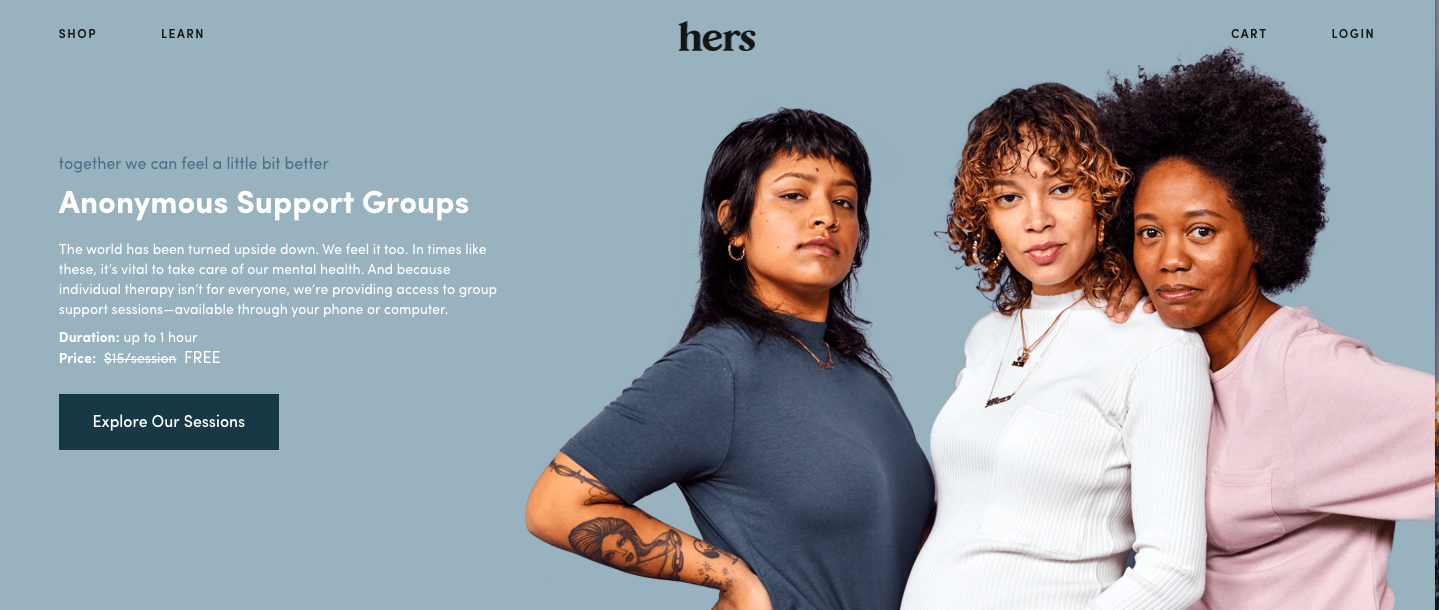Music
Trailers
DailyVideos
India
Pakistan
Afghanistan
Bangladesh
Srilanka
Nepal
Thailand
StockMarket
Business
Technology
Startup
Trending Videos
Coupons
Football
Search
Download App in Playstore
Download App
Best Collections
Technology
With women-specific health needs long ignored by tech giants, FLEX, the tampon replacement, raised $4 million and Nurx, the birth control delivery web platform, raised $5.3 million in 2016 (and went on to raise $93.4 million). Both companies became one of the top 10 companies out of more than 100 to raise the most money during their Demo Days at Y Combinator that year. By March 2017, it was reported that femtech companies had raised $1.1 billion since 2014, and the growth has only continued.
We spoke to CEOs and founders Gina Bartasi of Kindbody, Jill Angelo of Gennev, Kate Torgersen of Milk Stork, Molly Hayward of Cora and Liz Klinger of Lioness about how their companies have evolved from first entering the space and feeling like an island to now — a community of women changing the world for women.
&Investors would say, ‘Well, what lets the air out of the balloon? What can derail the business?,'& CEO and founder of the New York-based tech-enabled fertility company Kindbody, Gina Bartasi said. &And I would say, ‘Well, I guess if women went back to the old way of having children and they didn&t go to graduate school and they didn&t go to med school or business school and they started having babies again in their early 20s — then, thatwhat would cause the fertility world to come crashing into the ground.&&
She flatly says thathighly unlikely. Kindbody is Bartasithird fertility startup. She launched them all after going through her own fertility journey.
Torgersen started her first-of-its-kind breast milk shipping service after a four-day work trip during which she had to pump and fly home in her carry-on bag two gallons of breast milk for her eight-month-old fraternal twins.
These options didn&t exist before, and even where there was demand, it wasn&t recognized enough.
&Itbeen really amazing over the last four or five years that we&ve been around to see the different areas of womenlives sort of being addressed through commerce, through business, through business solutions — everything from fertility to breastfeeding and sexual wellness, pleasure, all of these things,& Hayward, who founded Cora, the period and bladder care brand, said.
Femtech isn&t just for women
There is, however, some gray area in femtech. Fertility, for example, has always been a mainstay in the space. Kindbody is actually Bartasithird fertility startup, but she notes fertility is not solely a womenhealth concern.
&Remember that 50% of all fertility issues are male-related,& she says. &It does directly affect them and they don&t talk about it. Women do. She adds that they&re seeing a rise in same-sex couples leveraging Kindbody rather than adopting.
Womensexual health and wellness brands sometimes are excluded (primarily from those outside of it) or are criticized for being included. For example, CB Insights, the market intelligence company used by many investors, routinely shares data on its own idea of femtech.
&For the most part, Lioness and pretty much anything sexual-pleasure-related is not on those maps,& Liz Klinger, the CEO and co-founder of Lioness, the worldfirst smart vibrator brand, shared with TechCrunch.
We reached out to the insights company for an updated femtech map. There isn&t one pleasure-centered (or even pleasure-adjacent) womenhealth startup on the most up to date map for womenhealth startups. For a site that touts itself as &loved by the smartest companies& for sharing &insights on probability, not punditry,& it is interesting that the $30 billion sex tech industry didn&t make it on this map. The only place we did find womenpleasure brands was on a market map for &ValentineDay& tech in 2020.

Source: CB Insights
In talking to some former and current employees, Klinger discovered rumors about potential reasons for the exclusion.
&I heard that there is a bit of pushback, both a combination of personal and also that some of their larger clients are Fortune 500.& They don&t think itrelevant to those clients.
As these challenges are seemingly par for the course for companies focused on womensexual pleasure, Klinger noted the most pleasant surprise in fundraising was how black and white it was when it came to who was going to invest and who wasn&t.
Bartasi pointed to undeniable macroeconomic trends that have emerged since she entered the space in 2008 with her first company Fertility Authority, making fundraising easier now than in the past (in addition to her second company, Progyny, being valued at nearly $2 billion before coronavirus).
&Heterosexual couples are waiting to have children and waiting to get married, and more and more same-sex couples are having children, which is relatively new,& says Bartasi. &Same-sex couples five and 10 years ago potentially adopted, but today they&re going through fertility at a rapid clip.&
She also notes the number of single women who are making the decision to freeze their eggs, opting against the traditional marriage-then-baby route.
Jill Angelo, CEO and founder of Gennev, the first-ever online clinic for women in menopause, also highlights mainstream media and the conversation around women shifting in general.
&You&ve got J. Lo doing the Super Bowl Halftime Show at 50-plus. You&ve got Laura Dern and Renée Zellweger, 50-plus, winning Oscars at the top of their game in their careers. You&ve got Gwyneth Paltrow talking about menopause on Goop.&
Education is instrumental to femtechgrowth
While companies in the space point to a diverse set of challenges with fundraising, each CEO discussed how essential it is to educate investors around womenhealthcare.
&It felt like — in my pitches — I was educating more than pitching, because it was a space people just didn&t know about,& Angelo recalls about when she first started raising money for Gennev in 2015.
This highlights the glaring gap in our education system in reference to health and sexual reproduction.
&What you&re trained on is how not to get pregnant, not how to get pregnant,& Bartasi pointed out. &And really, what nobody knows, even with the most fertile woman and fertile man having sex when sheovulating and when they&re supposed to, the chances of natural conception every month are only 20%. Itnot 50% or 60%.&
Molly HaywardCora was launched as a social impact initiative to provide organic feminine products to women and girls who did not have access to them. Their inability to obtain the products caused them to miss school, the result being they would fall behind the boys.
&You have to do a lot more work as an entrepreneur to explain the experience, how broken it is and why therean opportunity to change that,& Hayward says.
Similarly, Klinger found that those who presumably were the least aware of pleasure were the most interested.
&Our investors are from traditionally conservative places like Thailand — where sex toys are illegal — and Texas. Once I figured out people were looking for pleasure and education, it was a lot easier to figure out who to talk to.&
As education is at the core of activism, the extra legwork doesn&t come without at least some sense of reward.
&When I am explaining this and people are actually listening and paying attention — regardless of whether they&re going to make an investment or not — the fact that I&ve had this conversation with them, I do walk away feeling we&re raising awareness and normalizing breastfeeding,& Torgersen shared.
The mother of three hopes that as more people become educated on breastfeeding, it will make other mothers& lives easier.
In 2020, women are the majority of the U.S. workforce
As nearly half the labor force is women and more than half of all management positions are women, companies looking to retain employees have to accommodate womenhealth needs in ways they haven&t in the past. Femtech is on the front lines of providing not only solutions but data and information that hasn&t been available (or even established) elsewhere.
This is how Milk Stork had its big break quickly after launch. &Our first press release actually hit with Fortune and within 10 days we were contacted by one of the largest consulting firms in the world wanting to bring us in as a benefit for their North American employees,& Torgersen said.
She credits moms and predominantly female-staffed human resources departments. &What I think is truly amazing is that it was moms who are raising awareness. They were using Milk Stork on the retail side and then asking their employers to reimburse them for it or to provide it as a benefit for the other women at their company.&
Within a month, Torgersenteam put together an enterprise solution to offer Milk Stork as a benefit, something that wasn&t fully established at their launch. &The experiences women in femtech are solving have been invisible for so long.&
Bartasi discussed how doctors will share learnings within a practice about their patients to better understand trends in terms of medication, prescriptions and outcome. Kindbody is making these learnings more available to patients than ever before.
&We actually have predictive algorithms that the patient sees. Itcompletely transparent. You enter your age, your pregnancy history, what your ovarian reserve is — which is tested through our blood work — and itgoing to generate your chances of success. How many eggs you&re predicted to get. Theredata that allows for total transparency, which increases the confidence and the trust between patient and the doctor.&
KlingerLioness is centered on never-before-seen data tracking orgasms, and for those who don&t see the value in simply learning more about pleasure, she pointed out medical uses for the information available using the vibrator.
&For some people, italso tracking how certain medications or certain conditions might be affecting their pleasure and vice versa.& This can be extremely helpful as womensexual performance anxiety goes largely undiscussed.
Gennev, on the other hand, released the first-ever menopausal assessment, and itavailable for everyone. &Thereno ‘what to expect when you&re expecting& for menopause,& Angelo says.
Using the data from the questionnaire, they&re providing that. &We&re creating that roadmap and using technology to predict and help them see where they&re headed in the journey and where they&re at right now.&
Gennev has also already begun working on solutions for our new normal of sheltering in place due to the COVID-19 pandemic. Earlier this month, the company launched HealthFix, an initiative to provide remote access to doctors, in addition to what their telemedicine membership already offered.
&We&re expanding our HealthFix membership to go beyond just working with health coaches and behavioral changes in life to manage menopause to also include the doctors, our OB-GYN,& Angelo says.
&We have a team of 25 of them, and so that means you&ll have your medical team, your coach and your doctor all in one via a regular membership thataffordable, so that we&re not just for the top 1% of the 1%, but for every woman.&
Right now, it feels like the future of a lot of things has been paused, but even with discussions on the new normal beginning to start, rest assured the consistent growth in femtech will only continue following years of neglect.
&Competition is good when you&re in a space that people know nothing about because it raises the profile for everybody,& Angelo shared, a sentiment echoed by each CEO we spoke to.
And of the competition, Bartasi said, &The camaraderie and the lifting off of each other is remarkable and a testament to this group of women where we all do really share in opportunity and in helping each other.&
The proof is in the numbers. Femtech raised nearly $750 million in 2019, and itfounded by women who want healthcare experiences they desire but didn&t find. And, because womanhood isn&t an insular experience, there is room and demand for a diverse set of solutions, as women continue to take up more spaces in which they&ve historically only been a minority.
- Details
- Category: Technology Today
Read more: Original text too long. Text can have up to 4,000 words.
Write comment (91 Comments)Hims, the startup consumer health brand providing out-of-pocket physician services online, has launched group therapy services through its Hims and Hers brands as part of an initial push into mental health services.
The company first began exploring opportunities to expand into the mental health category around eight months ago, and accelerated its pace to respond to increased consumer demand caused by the COVID-19 pandemic.
Mental health and wellness has become a huge business opportunity for consumer startups as the stigma around seeking treatment for mental health issues has abated.
For Hims, which built its brand around the destigmatization of disorders like erectile dysfunction and sexual health and wellness, the extension into mental health made sense, according to founder and chief executive, Andrew Dudum . &Itprobably the simplest leap the company has made,& he said.
&Hair loss, STDs, acne, performance anxiety… These are really medical conditions that get to your core around confidence, self-worth and stigma… these are not topics of conversation,& Dudum said. &There is a big need in our customer base to help them with areas of anxiety, stress and depression… There is nothing more stigmatized than mental health.&
Hims and Hers are beginning their foray into mental wellness with anonymized group therapy and guided meditation sessions that won&t have the same hurdles to providing treatment that the company would have for individual therapy or text-based sessions.

Government regulations at the federal and state level require mental health clinicians to be licensed in-state, which means that the company is limited in the kinds of services it can offer before it rolls out its network.
Currently, the company has about a dozen mental health practitioners that itworking with through Regroup Telehealth, one of the largest providers of tele-psychiatry services in the country.
Ultimately, Hims envisions providing a continuum of care ranging from anonymous group therapy sessions, to telemedical consultations, to in-person, video consultations and an ability to issue prescriptions to folks that need it.
Like its other services, the mental health offerings are going to be capped at the provision of some very basic services and the company won&t be prescribing any medication for what could be considered controlled substances, according to the companychief medical officer, Dr. Patrick Carroll.
&We only treat low-risk patients,& Dr. Carroll said. &It will be the same thing for behavioral health… the conventional screen is a PHQ9… We will have a depression and anxiety screen. For those folks that get scripts we can make sure that their prescriptions line up with the tests and screens.&
That means the company won&t be prescribing medications like Xanax, Ritalin, Adderall or anti-psychotics for people with more serious conditions. &The majority of things that we will prescribe will be [serotonin re-uptake inhibitors],& said Caroll. Those are medications like Prozac, Zoloft and Lexipro.
To ensure that the companypractitioners are meeting the requisite standard of care, each interaction with a therapist will be recorded and roughly 10% to 20% of those interactions will be audited, per company policy. &We&re going to have the same quality structure in place,& said Dr. Carroll. &We will have therapists as well as advisers who are going to be part of the quality review process and review encounters to make sure that the guidelines are followed.&
The group therapy sessions, which will typically cost $15, are free for the next few months as the nation struggles to cope with the dramatic social changes caused by the governmentresponse to the COVID-19 epidemic.
Eventually the company expects to adopt a monthly subscription fee for its mental health offerings, including $50 per month for text-based therapy and more customized options. Prices will cap at a few hundred dollars per month.
Unlike companies like SonderMind, which announced the close of a new round of financing yesterday, Hims and Hers mental wellness offerings won&t be covered by any healthcare plan. Instead, itan out-of-pocket expense similar to the other services the company offers.
That model appears to be working. &We have seen over 1 million patients over the platform over the past year and a half,& said Dudum. &From high-risk cardiovascular disease and diabetes… The medical system that has been put in place by Pat and the 300 plus physician organizations… is one that is already treating very serious conditions.&
In some way, mental health is the most appropriate candidate for a telemedical offering, according to Steve Monte, a field lecturer with the Suzanne Dworak-Peck School of Social Work at the University of Southern California.
&I like to think about it as an idea whose time has come,& said Monte. &Coronavirus has shed a light on how useful these services are.&
Indeed, many companies already are providing virtual mental health services. Teladoc, the publicly traded telemedicine provider, has a subsidiary called BetterHelp, which offers mental healthcare via the phone.
For Forerunner Ventures co-founder and managing partner Kirsten Green, the movement into mental health by Hims was a very natural extension of the companycore thesis.
&The thing that drew me to the company was reimagining certain elements of healthcare and providing access to people,& said Green. &We&re not going to be able to service every medical need in this way. To the extent that there are things that can be handled in the appropriate high-integrity way that can be supplied digitally we want to be able to provide that to the customer.&
- Details
- Category: Technology Today
Read more: Hims launches group therapy services as first foray into broader mental health initiative
Write comment (91 Comments)
A startup that has framed itself as an Instagram for websites is now squaring up against Shopify as it nabs new funding from Googleventure capital arm.
Brooklyn-based Universe has just closed a $10 million Series A from GV. The funding round was well in the works before the COVID-19 pandemic took hold stateside; nevertheless, CEO Joseph Cohen definitely sounded relieved to have everything signed.
&Hopefully, it&ll take some weight off their shoulders that may have been there otherwise,& said GV general partner M.G. Siegler, who led the deal and is taking a seat on their board.
When the team launched out of YC two years ago, the initial aim was to be the go-to short link for young people and creatives to stick in their Instagram bios. The mobile app allowed users to create very basic landing pages, allowing them to type up some text, toss up photos and arrange their creation across a couple of web pages.
As the startup matures and looks to home in on a more robust business model, they&re now looking to build an incredibly low-friction commerce platform. Users can add a shopping &block& to their site, add a photo, description and price and then start accepting orders.
&We&ve gone from a landing page builder to a full-fledged website builder,& Cohen told TechCrunch in an interview.
Universe is going after what Cohen calls &very small businesses.& This could be an artist selling prints, a yoga instructor charging for Zoom classes or one of their latest customers, a farmer selling live bait. &These are people who don&t work at desks,& Cohen says.
Shopify has been one of the biggest tech success stories of the past several years, but Cohen sees weaknesses for Universe to capitalize on. Shopify is &complex and not mobile-first,& he says. Universe not only doesn&t require a developer to implement, it doesn&t seem to require someone thatparticularly tech-savvy.
The price of simplicity for the end user is a hefty cut for Universe. At launch, the company isn&t taking a percentage for the first $1,000 of a customerrevenue, but will take a 10% slice thereafter, a number thatnotably multiples higher than the rates of competitors.
Cohen acknowledges that if a business succeeds, this can be a significant expense for them, one that might push them to another platform. He say that he wants to figure out a model that can help his startup &grow and scale& with their customers, but he didn&t offer up any details on what that might look like.
The team is still working with free and paid &pro& tiers that offer advanced features like analytics. Commerce features will be available for both tiers.
Universe has raised $17 million to date. Other investors include Javelin Venture Partners, General Catalyst and Greylock Partners.
We chatted with GVM.G. Siegler about closing this deal and how his role as an investor has shifted since the current crisis took hold. You can read that interview on Extra Crunch.
- Details
- Category: Technology Today
Read more: Mobile site builder Universe raises $10M from GV as it endeavors into commerce
Write comment (100 Comments)

Sony has just unveiled the controller we'll be using to play the PS5 - it's called the DualSense Controller, and it sports a number of improvements that are concentrated on making using the controller feel more 'immersive'.
Among these new features are adaptive triggers with haptic feedback, a built-in microphone that will allow you to talk to
- Details
- Category: Technology Today
Read more: Meet the PS5 DualSense controller
Write comment (92 Comments)
The coronavirus pandemic has pushed entrepreneurs and investors into unknown territory.
Google GV just led a $10 million investment in Universe, a low-friction website builder thatventuring into the world of commerce.
The investment was in the works before COVID-19 hit America in force, but things were finalized for the Brooklyn startup in late March. I chatted with M.G. Siegler, the general partner at GV (and former TechCrunch writer) who led the deal, about how the crisis was affecting his investment work and how he was balancing portfolio work with sourcing new deals.
This interview has edited for length and clarity.
TechCrunch: This deal sounds like it was in the works before pandemic concerns really hit America, but when you saw this situation arise, did it change your thinking about this deal at all?
M.G. Siegler: The reality is we&re still going to be continuing to look for interesting opportunities to invest in. History has shown that even during great financial turmoil, many companies are still being built, although itcertainly not easy for anyone, given that we&re all stuck inside and trying to make things work. I think Universe is in an interesting spot; they have a tool that can potentially help some of these struggling businesses move online quicker and create commerce opportunities that they really need to think about given the current realities.
So thereno thought that we shouldn&t do something just because of the current macro environment if we&re really passionate about it to begin with. Obviously, therevarying degrees of that for different sectors, but I do think that Universe had been in a great position before this situation, and it seems like they have different opportunities now.
- Details
- Category: Technology Today
Read more: GV’s M.G. Siegler on portfolio management, crisis fundraising and his latest investment
Write comment (98 Comments)

Microsoft has agreed to buy the domain corp.com in an effort to prevent others from abusing it for their own gain.
Back in February, KrebsOnSecurity reported on the story of a private citizen who decided to auction off the domain in question at a starting price of $1.7m.
The domain corp.com is considered dangerous because of the fact that years of
- Details
- Category: Technology Today
Read more: Microsoft acquires corp.com to save it from wrongdoers
Write comment (91 Comments)Page 1021 of 1420

 14
14





